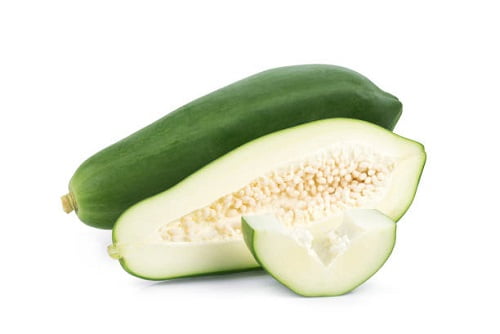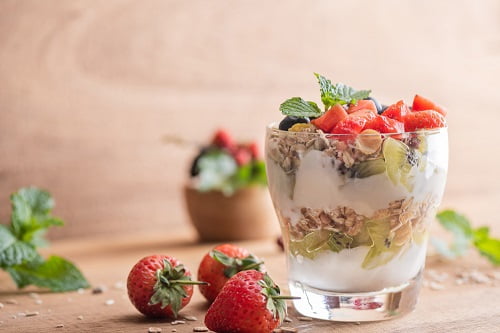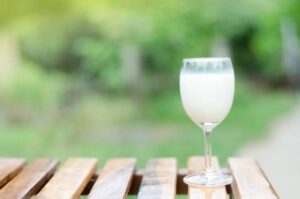Peptic ulcers are open sores that develop on the stomach lining and the upper portion of your small intestine. The most common symptoms of a peptic ulcer are stomach pain, nausea, and heartburn.
Ulcers can be majorly classified into:
- Gastric ulcers that occur on the lining of the stomach
- Duodenal ulcers that occur on the inside of your small intestine (duodenum) – the first part of the small intestine that attaches to the stomach.
Peptic ulcers are caused mainly by infection with the bacterium Helicobacter pylori (H. Pylori) and long-term use of non-steroidal anti-inflammatory drugs (NSAIDs) such as ibuprofen, aspirin, and diclofenac. Modern treatment with antibiotics and acid-blocking medications has proved useful. However, spicy foods and alcohol may make your symptoms worse.
This article looks at the best Nigerian foods that can make up an ulcer diet and the foods to avoid.
10 Nigerian Foods to Eat When You Have Peptic Ulcer
The best foods for ulcer patients are those that are easily digested and rich in antioxidants and fiber.
Foods that are easily digested will lead to less production of stomach acid – leading to reduced irritation of the ulcer.
They include:
1. Unripe Plantain
Unripe plantains are rich in resistant starch, a type of prebiotic that reduces the pH of the stomach and reduces inflammation.
Green plantains have long been in use in traditional medicine to treat peptic ulcers. It is believed to help promote the healing of ulcer sores, reduce acid secretion, and reduce the growth of H-pylori [2].
To treat ulcers in traditional African medicine, the unripe plantain together with its peel is diced into small cubes and poured into an airtight container filled with clean water. The mixture is left to ferment for 3 days. After fermentation, the liquid extract that is sieved out is used as medicine.
Related: Unripe Plantain: Nutrition, Health Benefits, Recipes, and Side effects
2. Vegetables
They are packed with antioxidants, vitamin C, and fiber that will help promote the fast healing of ulcer sores. Vegetables that are great for your ulcer diet include:
- Leafy greens such as spinach, pumpkin leaves (ugu), water leaf, jute leaves (Ewedu), and uziza leaves.
- Carrots
- Garden eggs
- Bell peppers
- Green bean
3. Unripe Pawpaw (Papaya)
Just like plantains, unripe pawpaw has been in use in traditional African medicine to treat peptic ulcers.
Studies have found that the flavonoids and antioxidants found in pawpaw may help reduce the damage done to the lining of the stomach from H. pylori or NSAIDs [3].
In traditional African medicine, the same process used for preparing unripe plantain is also used for unripe pawpaw. The liquid extracted from the fermentation is used as medicine for about seven days, or until symptoms disappear.
However, seek professional medical advice before attempting any traditional remedies.
4. Apples and Pears
Apples and pears are high in dietary fiber and antioxidants. Fiber can help lower the amount of acid in your stomach, reduce pain, and prevent ulcers.
Polyphenols and vitamin C found in apples and pears are good antioxidants that help protect the body tissues from injuries and heal ulcers quickly.
5. Whole grains
Whole grains such as oats, quinoa, brown rice, and fonio are rich in dietary fiber.
Their high fiber and nutrient content can help ease pain and suppress acid production.
6. Ogi (Akamu)
Ogi is a fermented cereal that is made up of healthy grains such as millet, sorghum, maize, and soybeans.
It is a healthy probiotic that is easily digested and is gentle on the stomach. You can sweeten it with honey or date sugar.
7. Lean meat and Fish
Lean meat such as lean beef, chicken, goat meat, and organ meats are great low-fat protein sources for your ulcer diet.
Healthy fish like salmon, mackerel (Titus), and sardines provide omega-3 fats, which can reduce inflammation and may help prevent another ulcer.
8. Bean pudding
Moi-moi is a delicious, savory steamed bean pudding made from a mixture of blended black-eyed peas and other ingredients. It is easily digested and rich in protein. It is a great addition to your ulcer diet.
Also, you can eat Okpa (Bambara nut pudding). It is equally delicious and full of protein.
However, avoid spicy moi-moi or okpa as spicy food can aggravate stomach pains.
9. Sweet Potato
This healthy tuber crop is high in fiber and vitamin A.
Studies have found that foods containing these nutrients can help prevent the formation of duodenal ulcers [4].
Other foods with a good dose of vitamin A include spinach, carrots, and beef liver.
10. Yogurt
Yogurt is rich in protein and “good” bacteria called probiotics.
They help ulcers by providing healthy bacteria that fight off H.pylori infection. They also help treatments work better.
Foods to Avoid if You Have Peptic Ulcer
- Milk: In the past, ulcer patients were told to drink milk. But recent studies have found that drinking milk can worsen your ulcer symptoms – as milk digests slowly and causes your stomach to produce more acid. Avoid dairy products containing fatty cheese, cream, and whole milk.
- Beverages with caffeine: Caffeinated beverages like coffee can increase stomach acid and worsen ulcer pain.
- Alcohol: Alcohol erodes the protective lining of the stomach and leads to further inflammation and bleeding. Avoid wine, beer, and spirits.
- Heavily spiced foods: Although peppery foods do not cause ulcers, they may play a role in worsening your symptoms. Avoid foods containing hot chili peppers, black pepper, and spicy tomato stew.
- Fried foods: They digest slowly, which can increase stomach acid and lead to bloating and stomach pain.
- Citrus fruits and juices: Fruits like lemon and orange are known for their high acidic content. So consume these fruits with caution.
- Chocolate: It can increase stomach acid production, and some people find that it triggers heartburn and acid reflux.
The Bottom Line
Although foods don’t cause or cure peptic ulcers, your choice of foods can make a big difference in how you feel and how quickly your ulcer heals. Aim to eat a diet rich in fiber, vitamins, and antioxidants.
Create an ulcer diet that is rich in vegetables, fruits, whole grains, sweet potatoes, and probiotics. Then limit alcohol, caffeine, spicy foods, fried-fatty foods, and milk.
Additionally, it is best to eat two hours before bedtime and eat food in small portions.
- Vomero, Nathália Dalcin, and Elisângela Colpo. “Nutritional care in peptic ulcer.” Arquivos brasileiros de cirurgia digestiva : ABCD = Brazilian archives of digestive surgery vol. 27,4 (2014)
- Prabha, P et al. “Indigenous anti-ulcer activity of Musa sapientum on peptic ulcer.” Pharmacognosy research vol. 3,4 (2011)
- Ezike, A C et al. “Carica papaya (Paw-Paw) unripe fruit may be beneficial in ulcer.” Journal of medicinal food vol. 12,6 (2009)
- Aldoori, W H et al. “Prospective study of diet and the risk of duodenal ulcer in men.” American journal of epidemiology vol. 145,1 (1997)
Get new free and exclusive health tips delivered straight to your inbox!





